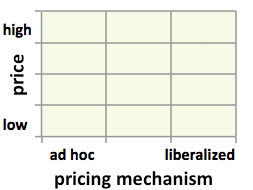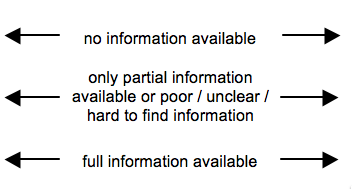Difference between revisions of "Fuel Prices Cote d'Ivoire"
***** (***** | *****) |
***** (***** | *****) |
||
| Line 8: | Line 8: | ||
In April of 2010, a strike of mainly taxi and bus drivers forced the government to reduce the price of Diesel. This reduction was probably not compliant with the pricing formula. However, the price for gasoline remained unchanged, as the majority of the striking interest groups uses diesel only (→Annex A2). | In April of 2010, a strike of mainly taxi and bus drivers forced the government to reduce the price of Diesel. This reduction was probably not compliant with the pricing formula. However, the price for gasoline remained unchanged, as the majority of the striking interest groups uses diesel only (→Annex A2). | ||
| + | |||
| + | |||
| + | Fuel prices are subject to ceilings, uniform throughout the country for gasoline, diesel, and kerosene. In Mar 2008, sharp increases in food and fuel prices sparked riots, injuring more than a dozen people. LPG prices have been frozen since 2008, and other fuel prices since April 2010. LPG prices set by the government are meant to be maximum prices, but often they represent minimum prices on the market. The Ministry of Commerce posts minimum and maximum prices of essential food and other items, including, gasoline, kerosene, diesel, and LPG, by location several times a month. For LPG, the government price is the minimum observed on the market, and actual prices have been up to 39% higher.(Source: Kojima, Masami. (2013, forthcoming). “Petroleum product pricing and complementary policies:Experience of 65 developing countries since 2009.” Washington DC: World Bank.) | ||
|Fuel Currency=FCFA | |Fuel Currency=FCFA | ||
|Fuel Price Exchange Rate=472.9 | |Fuel Price Exchange Rate=472.9 | ||
| Line 28: | Line 31: | ||
|Fuel Price Factsheet Source Annotation=Annex A1 | |Fuel Price Factsheet Source Annotation=Annex A1 | ||
}} | }} | ||
| + | {{Fuel Price Factsheet Source}} | ||
{{Fuel Price Factsheet Source}} | {{Fuel Price Factsheet Source}} | ||
Revision as of 13:49, 15 February 2013
Part of: GIZ International Fuel Price database
Fuel Pricing Policies
| Local Currency: | FCFA |
| Exchange Rate: | 472.9
|
| Last Update: |
No official information regarding fuel prices could be found on the governments web pages. The “Ministere des Mines et de l’Energie” appears to be responsible for the regulation and supervision of the fuel market. However, no information could be found on their web page, as the “Hydrocarbure” section appears to be offline.
An internet article (→Annex A1) states, that there exists an automatic fuel price formula, which was installed on recommendation of the World Bank.
According to several articles, prices seem to change a couple of times each year.
In April of 2010, a strike of mainly taxi and bus drivers forced the government to reduce the price of Diesel. This reduction was probably not compliant with the pricing formula. However, the price for gasoline remained unchanged, as the majority of the striking interest groups uses diesel only (→Annex A2).
Fuel prices are subject to ceilings, uniform throughout the country for gasoline, diesel, and kerosene. In Mar 2008, sharp increases in food and fuel prices sparked riots, injuring more than a dozen people. LPG prices have been frozen since 2008, and other fuel prices since April 2010. LPG prices set by the government are meant to be maximum prices, but often they represent minimum prices on the market. The Ministry of Commerce posts minimum and maximum prices of essential food and other items, including, gasoline, kerosene, diesel, and LPG, by location several times a month. For LPG, the government price is the minimum observed on the market, and actual prices have been up to 39% higher.(Source: Kojima, Masami. (2013, forthcoming). “Petroleum product pricing and complementary policies:Experience of 65 developing countries since 2009.” Washington DC: World Bank.)
Fuel Prices and Trends
| Gasoline 95 Octane | Diesel | |
|---|---|---|
| in USD* |
|
|
| in Local Currency |
|
|
* benchmark lines: green=US price; grey=price in Spain; red=price of Crude Oil
Fuel Price Composition
Price composition.
No information available.
At a Glance
| Regulation-Price-Matrix |
| ||||
 |

|

|

| ||
No information regarding fuel prices could be found on the ministries/governments website.
Sources to the Public
| Type of Information | Web-Link / Source |
|---|---|
| Other Information | http://fr.allafrica.com/stories/200907080306.html (Annex A1) |
| Other Information | http://www.energie.gouv.ci/ (Ministry of Mines and Energy) |
Contact
Please find more information on GIZ International Fuel Price Database and http://www.giz.de/fuelprices



















